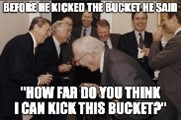Are you looking for an alternative way of saying that someone is about to die? If they aren’t close to you or your family, you could say that they will “kick the bucket” soon. This post unpacks the meaning and origin of this expression.
Meaning
To “kick the bucket” means to die. It’s a crude way of saying that someone passed away. Most people will use “kick the bucket” to describe their own death or the death of someone they know but are not close to them or their family.
For instance, saying that your mother “kicked the bucket” would be improper, and the people in your family wouldn’t appreciate you saying that at her funeral. It’s a colloquial expression that only suits use in social communications and informal situations.
You could also use it to describe the failure of projects and tasks. For instance, your proposal is dead in the water and kicked the bucket after the board turned it down.
Example Usage
"Sadly, Jared's dad kicked the bucket. I didn't know him well while he was alive, but I heard he was a good person. Jared is a mess right now."
"There's a couple of things I want to do before I kick the bucket. I wrote this bucket list to see how many of them I can achieve before I die."
"Everyone has to kick the bucket sooner or later. We're not immortal, and there's no way any of us will live forever."
"I watched that Darwin Awards" TV show last night. It's impressive to see how stupid human beings can be with their behavior. The show is people kicking the bucket over the silliest mistakes."
"One day, my grandma will kick the bucket, and I'm going to inherit a fortune from the old bag. Then we're going to party hard."
"Jeff's partner at work kicked the bucket. Now he finds out that he had over a million in company debt he didn't know about. He's meeting with the attorneys right now."
“I feel like I’m going to kick the bucket. My blood pressure feels so low, and it’s like I’m going to pass out every few minutes. I hope someone gets me that transfusion soon.”


Origin
The expression "kick the bucket" originates from 16th century England. The phrase may have had some influence from the French term "trebuchet," meaning balancing a yoke.
Peter Levin published the "Manipulus vocabulorum. A dictionarie of English and Latine wordes," in 1570. It includes the following passage regarding kicking the bucket, but in archaic language.
"A Bucket, beame, tollo."
Another version of the saying appeared in the Shakespeare play, "Henry IV Part II," performed in 1597.
"Swifter then he that gibbets on the Brewers Bucket."
"The Grose Classical Dictionary of the Vulgar Tongue" published the modern meaning of the expression in 1785, where it appears as follows.
"To kick the bucket, to die."
Phrases Similar to Kick the Bucket
- Pass away.
- Die.
- Punch your ticket.
- Croak.
Phrases Opposite to Kick the Bucket
- Alive and kicking.
What is the Correct Saying?
- Kicked the bucket.
- Kick the bucket.
Ways People May Say Kick the Bucket Incorrectly
You would address someone close to the deceased as “”I’m sorry your loved one kicked the bucket.” That approach would show that you have no empathy for the persons emotional state and you didn’t care much for the deceased while they were alive.
Acceptable Ways to Phrase Kick the Bucket
You can use the expression “kick the bucket” when you’re talking about someone passing away or your passing. Typically, you won’t know the person very well, as its somewhat of a crude and uncultured way of referring to the traumatic event of someone dying. You can also use the phrase when referring to the failure of tasks, projects and products or items.
You could say that the new product line kicked the bucket after last quarters sales we down for the third quarter running. You could say that your friends father kicked the bucket after suffering from heart disease for a decade.